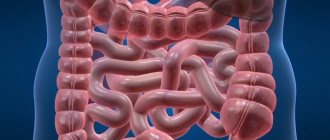Home / After childbirth / Why there are no periods after childbirth and when will they come?
113246
4
- When should menstruation begin after childbirth?
- Why don't you have periods while breastfeeding?
- Other factors
- What are periods after childbirth?
- When to see a doctor
- Video about why periods disappear
All women who have gone through childbirth sooner or later ask the following question: “Why are there no periods after childbirth, and when will they come?” But really, when should the monthly cycle begin and return to normal?
When should your period come after childbirth?
It is impossible to answer this question unambiguously. If your period does not come, it is important to find out the reason for its absence. This period can last from several months to a year, and if concomitant diseases are detected, menstruation will be absent for a longer period of time.
The production of breast milk for feeding the baby is the main function that the organs of the reproductive system must cope with.
A delay in menstruation after childbirth is associated with the way feeding occurs:
- the child is fed breast milk;
- receives milk, complementary foods and formula;
- The only source of nutrition is formula milk.
When wondering why there is no period, it is important to consider the way you feed your baby.
With artificial feeding
When a woman completely transfers her child to artificial feeding, the restoration of menstruation occurs quickly. As soon as the uterine mucosa heals, the first discharge appears.
Your period may come a month and a half after giving birth, in some cases you need to wait about 5 months. During this time, the body's ability to conceive is restored, and if there are no plans to become pregnant again, it is necessary to use contraception.
The first postpartum periods begin with small discharge, and over time their amount increases. They can be observed several days after the baby is born. However, we are talking about bloody discharge called lochia. Very often they are confused with menstruation.
In the absence of menstruation, lochia bothers a woman for about 1–2 months, until the uterus and its mucous membrane return to normal. If there was a caesarean section, this period may be prolonged. At first, the discharge is bright red, then gradually darkens, and its quantity decreases. At the end of the 4th week they take on the appearance of bloody streaks.
With mixed feeding
With mixed feeding of a child, menstruation occurs 3 or 4 months after birth. Sometimes this period extends to a year. This time period is due to the fact that the mother stops feeding the baby at night and in the morning. The sooner this happens, the faster your period will come.
In the morning and at night during breastfeeding, the body produces prolactin. The main purpose of this hormone is to produce breast milk and suppress the ovulation process. When complementary foods are introduced, its amount in the body decreases.

Due to the fact that significant changes occur in the body a few weeks after childbirth, the cycle can take a long time to recover, and the delay in the arrival of the 2nd menstruation in the postpartum period is not uncommon.
When finding out the reasons for the delay, it is important to exclude re-conception. The female body is designed in such a way that the onset of the next pregnancy is possible before the first menstruation appears after the birth of the child.
When breastfeeding
In mothers who breastfeed naturally, the usual discharge may be absent for a long time. This is due to the large amount of prolactin in the body when the baby receives only breast milk.
In medical science, the phenomenon of no menstruation for a year or more after childbirth is called lactational amenorrhea. Sometimes this condition lasts until lactation completely stops and can take up to one and a half years.
Many women begin to sound the alarm when they don’t have a period for six months or even several months. However, there is no cause for concern. From a physiological point of view, this condition is normal if breastfeeding is the only source of nutrition for the newborn.
https://youtu.be/92RoFZ3Y1zA
When does the first menstruation occur after childbirth?
It is impossible to say exactly when a woman will get her period after giving birth. Much depends on the method of feeding:
- With breastfeeding on demand, complete restoration of the cycle can be expected no earlier than after 12 months.
- When breastfeeding a baby by the clock, menstruation begins on average after 8–12 months.
- With mixed feeding (breast + formula, additional water), menstruation will appear in about 3-5 months.
- With completely artificial feeding, the cycle will begin to recover within one to two months after the birth of the child.
The restoration of reproductive function is additionally affected by:
- hereditary factor;
- individual characteristics of the mother's body;
- psychological component;
- general health, presence of chronic diseases.
During breastfeeding, periods are different from those before childbirth. The hormone prolactin, necessary for milk production in the mammary glands, is synthesized in large quantities. It also suppresses the maturation of follicles and eggs. Therefore, the cycle is irregular and will become stable only after the complete cessation of breastfeeding. There are situations when you had your period and disappeared again.
The effect of menstruation on lactation
Many young mothers are concerned about the quality of milk produced in the breast when menstrual function is restored.
The appearance of menstruation is not a reason to stop lactation. They do not affect the quality and taste in any way. But when menstruation returns, the amount of milk in the breast may decrease. In order for the baby to have enough food, it is necessary to compensate for the deficiency with more frequent feedings.
This stimulates milk production in greater quantities and prevents lactostasis in the mammary glands, that is, stagnant processes.
Reasons for missing periods after childbirth
If a woman’s well-being after the birth of a child does not cause concern and is not complicated by any pathology, then a delay in menstruation after childbirth is normal. There are a number of factors that influence the duration of the restoration of the menstrual cycle.
One of the main reasons is considered to be lactational amenorrhea - the absence of blood discharge associated with the production of prolactin in the body during lactation. It is important to exclude pregnancy and hormonal imbalances in the body.
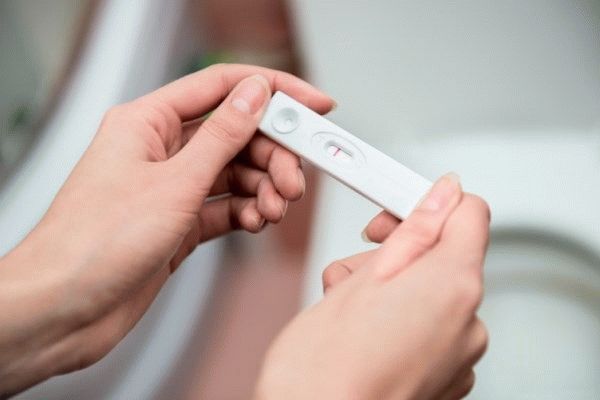
Pregnancy
A delay in menstruation after childbirth may indicate that a new pregnancy has occurred, especially if there was sexual intercourse without the use of contraceptives. This is possible approximately 2-3 weeks after birth. To minimize the risk, doctors give some recommendations: abstaining from sexual intercourse for about 5-6 months, taking contraceptives for 2 years after the birth of the baby.
It is also possible to get pregnant while breastfeeding, even though you feed your baby on demand in the morning and at night.
If a year has passed and you have not had your period, consult your doctor.
Hormonal disorders
If, during a delay in menstruation, the test shows a negative result and a new pregnancy is excluded, this may indicate the development of hormonal disorders caused by a pathological process in the organs of the reproductive system.
Hormonal imbalance is associated with inflammation in the ovaries and uterus, endometriosis, as well as the presence of a large number of ruptures and injuries during childbirth. A delay in the second period may also indicate these pathologies.
Hormonal imbalance also affects lactation. There is a high probability of transferring the child to artificial feeding.
If you miss your period, it is important to immediately contact a specialist and undergo the appropriate tests.
What are periods after childbirth?
When your period arrives after childbirth, you will notice that it is slightly different from the period you had before giving birth. If a girl’s periods were irregular before giving birth, then after giving birth they will become more regular, without delay.
On average, the menstrual cycle lasts 28 days, but it can vary from 21 to 35 days. Menstruation lasts from 3 to 6 days, sometimes it can reach 8 days. Pain during menstruation also decreases. And your periods can be either less or more abundant. The largest volume of blood during menstruation is released on days 1 and 2. Until your cycle is restored, you should avoid tampons and pads that have an absorbent mesh surface.
What is the reason
Carrying and giving birth to a baby is quite a serious and responsible matter. And every woman strives to create optimally comfortable conditions for this process. First-born women are most susceptible to anxiety. Still, this is the first time in their lives, and it is not entirely clear what and how it should really be. Reading books and talking with a gynecologist is more of a theory. But in practice everything is completely different. Let's add to this that a delay in menstruation after childbirth can be accompanied by discomfort and pain.

We immediately need to reassure all mothers: the first and subsequent periods will not form into a normal cycle. For some, this may take up to a year. Another very serious question immediately arises about whether it is possible to get pregnant, and whether the delay is related to a possible pregnancy. Again, we must take into account the myths that exist that breastfeeding does not occur during breastfeeding. Is it so?
general information
The restoration of menstruation is a hormonal process. The main reasons why a woman does not have periods for a whole year after childbirth include hormonal changes and the passage of the lactation period.
In addition, the absence of menstruation may warn that the woman will soon have to give birth again. The onset of a new pregnancy is not a rare occurrence while breastfeeding an older child.
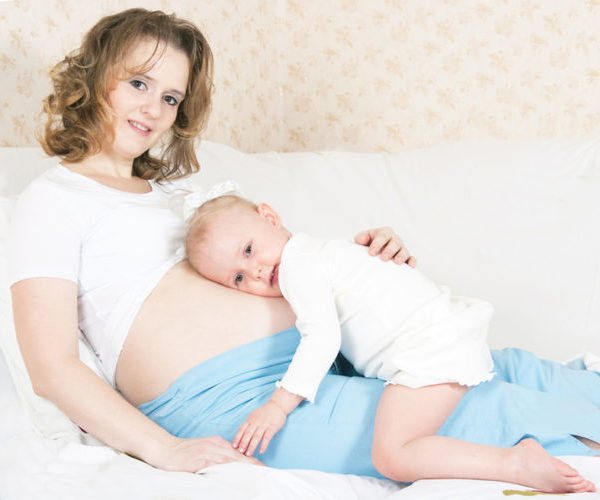
Other factors that provoke a serious delay include the following:
- features of the daily routine;
- nutritional characteristics of a young mother;
- duration and quality of a woman's sleep.
A young mother should only eat healthy food; her diet should be balanced. It is advisable to sleep not only at night, but also during the day. You should not worry or be nervous, and any diseases that begin after childbirth should be treated promptly.
How to understand that recovery has occurred
During the postpartum period, for some time, a woman experiences bleeding that lasts quite a long time. This is not menstruation, but a normal cleansing of the body. When does standard menstrual flow appear:
| Period | Cause |
| From birth to 30 days | Cleansing the body |
| 2 – 2.5 months after birth | Lochia. Normalization of the full functioning of the ovaries and uterus, the entire female body |
| After 3-6 months | Provided that the woman does not breastfeed her baby, full periods can be expected |
| 10 months – a year or more | Actively breastfeeding your baby |
| After 1.5 - 2 months | This period is calculated from the moment the baby is either weaned or fed with other food products (eggs, mixtures, purees) |
| Indefinite term | If a woman has experienced severe stress, physical injury or a serious illness, the first and subsequent periods will occur only after treatment or complete calmness |
Restoration of the menstrual cycle
After childbirth, delay is a completely normal reaction of the body. After all, menstruation does not appear on its own, but thanks to hormones produced by the body. It is impossible to say for sure how long it will take for the background to normalize. This depends on the individual characteristics of the fair sex, past illnesses and operations, as well as psychological mood. Most often, everything drags on for at least six months. Less than 4 months. With normal lactation and feeding in general, after a year or until weaning (if you feed until 2-3 years, then menstruation will appear only after weaning, after about 2 months).

One more thing needs to be taken into account and not be alarmed: the number of days can be increased by several days or, conversely, reduced. So, with a menstrual cycle of 21 days, you can observe 5 days instead of three. And with a cyclicity of 28-30, a reduction from 7 to 5 days.
Should I worry or not?
Any delay is always associated with pregnancy. And even more so after childbirth. In fact, the first few months of discharge occur without ovulation, which means fertilization cannot occur. Although there is a risk, it is minimal and is associated only with the structural features of the woman in labor. There are such incidents that ovulation occurs without the appearance of blood. The reason for this is hormonal imbalance.
It’s better, of course, not to take risks, but to worry about contraceptives in advance. There is no point in waiting for the cycle to fully recover. We should not turn a blind eye to long delays. Especially if you are not breastfeeding. If your first period has passed, and then stopped for 3 or more months, then a trip to the doctor should take place immediately. Because these may be symptoms:
- complications after childbirth;
- insufficient amount of estrogen;
- the appearance of cystic formations;
- inflammation of the appendages or uterus;
- tumor;
- Sheehan's syndrome.

But first of all, buy a pregnancy test. It is possible that you are part of that group of women who ovulated without discharge.
Possible causes of delay after childbirth
Childbirth is a complex and responsible process for every woman. During the postpartum period, the young mother experiences spotting for some time. After 3 months have passed after giving birth and menstruation has not occurred, the problem of its absence should be identified. The following reasons are identified:
- Prolactin production during breastfeeding. Prolactin is a hormone that ensures the availability of breast milk and improves the breastfeeding system. If a woman is breastfeeding, the hormone prevents the onset of ovulation and thereby ensures the absence of menstruation for a long period. It can be 7–8 months.
- Insufficient amount of estrogen in a woman’s body. Estrogen is a hormone that is responsible for the formation of follicles in the ovaries and the onset of ovulation. If there is insufficient amount of the hormone, menstruation may not occur for a long time. If the child is bottle-fed, the average period for the onset of menstruation is 2 months. A subsequent delay in menstruation is a relative deviation from the norm.
- The occurrence of pathology in the genital organs. A prolonged absence of menstruation may not be entirely positive. For example, a cyst that forms in the ovaries provokes hormonal imbalances and causes a delay in menstruation. If you have unclear symptoms, you should immediately consult a doctor.
- Development of the oncological process in the uterus. The formation of various tumors in the ovaries or uterus often begins asymptomatically. But this pathology also causes the absence of the menstrual cycle. Here you need to carefully monitor general manifestations and it is best to immediately get a recommendation from your personal gynecologist.
- Infections of various types. They can cause disruptions and menstrual irregularities, as they completely change all the correct processes in a woman’s hormonal background, and provoke long-term inflammation. It should be noted that a delay in menstruation is not the only factor of infection. It may be accompanied by other characteristic signs.
- Nervous stress on the body. Childbirth causes enormous stress for the body, and caring for a baby requires a lot of attention and effort. As a result of fatigue and lack of sleep, a woman’s body becomes nervous. It may well cause a prolonged absence of the menstrual cycle.
- Onset of pregnancy. Many women believe that after childbirth, the absence of menstruation cannot be a sign of pregnancy. But cases often arise when ovulation occurs, and then fertilization of the egg occurs. If you are not planning another pregnancy right away, it is still worth taking precautions.
- Tumor formation in the pituitary gland. During the course of such a serious illness, the level of hormones drops significantly or is completely absent. There is a complete disruption of the woman’s reproductive system and a prolonged absence of menstruation. The doctor must prescribe certain research methods and a treatment regimen.
Is pregnancy possible?
The opinion that you cannot get pregnant during lactation is wrong. Ovarian function is suppressed due to the synthesis of large amounts of prolactin. But six months after giving birth, a gradual recovery is observed. Therefore, pregnancy is possible.
Mixed feeding of the baby increases the likelihood of reconception during breastfeeding. The amount of prolactin decreases, and ovulation can occur at any time. Therefore, a woman should consider contraception to avoid unwanted pregnancy. If signs of pregnancy appear in the absence of contraception, a test or ultrasound should be done.
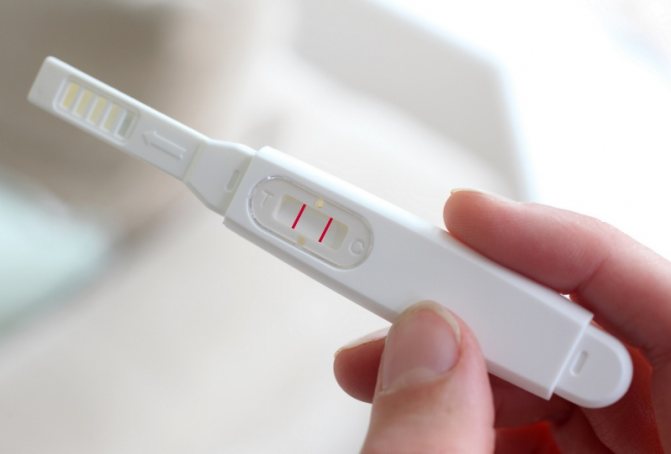
Is pregnancy possible while breastfeeding?
What to do if your period is late for a long time
A long delay in menstruation causes unreasonable anxiety in any woman. Before you panic, you should rule out possible causes and take the following steps.
- Take a pregnancy test. If your period is more than a week late, you can test the level of hCG in your urine. If the pregnancy test is negative, it will only show one line. To obtain more accurate results, you need a personal examination by a gynecologist;
- Visit an endocrinologist. If a disease such as pituitary apoplexy develops, you need to consult a special doctor. He will order hormone tests. And then, if necessary, further research;
- Check for other symptoms of any disease. If 5 months have passed after giving birth, taking into account the artificial feeding of the baby, and menstruation has not yet arrived, then the woman should carefully examine the condition of the body. Most diseases of the reproductive system have side symptoms, which can manifest themselves in minor pain, low-grade fever, constant lethargy and fatigue;
- Visit a gynecologist and undergo a general examination. Every woman must undergo an examination by a doctor for some time after giving birth and pass all the necessary tests. They will show the general condition of the body and indicate the presence of inflammation. And in the absence of menstruation, this procedure is mandatory!
Preventive measures for delay after birth of a child
A delay in menstruation is not always a sign of serious abnormalities or diseases. Each woman’s body is individual, and the menstrual cycle can improve at different periods of time.
It happens that after a full examination, no serious reasons for the absence of menstruation are found and the woman is completely healthy. Therefore, to restore the regularity of menstruation, you can follow a few simple rules.
- Good nutrition and rest. A young mother must monitor her diet and eat all the substances and trace elements necessary for the body. After all, most breastfeeding women adhere to a certain diet. You should also ensure maximum rest;
- Daily walks in the air. At first, after the birth of a baby, women return to their normal state. To avoid the development of postpartum depression, as well as for the complete recovery of the body, being in the air every day is a prerequisite;
- Moderate physical activity and active mobility. Many young mothers begin to exercise after 2 months. This has a positive effect on the recovery of the body and ensures good health. Therefore, such loads and mobility have no contraindications for a healthy woman in the postpartum period;
- Prevention of nervous stress. Most diseases occur due to a disorder of the nervous system, so it should be carefully protected. No matter how difficult it may be during the postpartum period. There is no need to be upset over trifles and find more harmony in the world around you.
It is worth summing up some results at the end and saying that before consulting a doctor due to a delay in menstruation, you need to study all the manifestations of symptoms in advance. If they are sufficiently alarming, then only a qualified doctor will make the correct diagnosis and prescribe quick, effective treatment.
Reasons for missed periods while breastfeeding
Lactational amenorrhea or delayed menstruation during breastfeeding with a negative test is a normal condition from a physiological point of view for the female body after childbirth.
It’s another matter if the due date is approaching, there is no menstruation and there are symptoms such as pain in the lower abdomen, itching or burning in the vagina, discharge. This is a reason to see a doctor.
Possible reasons for the delay of menstruation in a young mother:
- improper, unbalanced diet;
- excessive physical activity;
- stressful conditions, depression;
- development of endocrine diseases;
- ovarian dysfunction;
- diseases of the pelvic organs after childbirth.
It is important to find out why there are no periods. For physiological reasons there is no cause for concern. If a woman has weaned her baby from the breast or is supplementing him with formula, and the cycle is not restored, she must contact the clinic.
Physiology of childbirth
Signs such as increased excitability of the uterus and lowering of the fetus closer to the entrance to the pelvis are considered harbingers of labor. Also a sign of imminent labor is the release of a plug - the secretion of mucus, which is the contents of the cervical canal. Before the birth itself, an outpouring of amniotic fluid is observed.
The process of labor is usually divided into several stages:
- Revealing stage. During this period, the uterus prepares for labor. Due to the contraction of the muscles of the reproductive organ, which are involuntary (contractions), the cervix begins to open during this period. This usually lasts for primiparous women up to sixteen hours; with repeated labor, this period most often decreases to ten hours.
- The stage of expulsion of the fetus from the uterus. At this stage, pushing occurs, which is characterized by voluntary strong contractions of the uterine muscles. At this time, the fetus begins to move along the paths and leaves the woman’s organs.
- Postpartum stage (birth of placenta). During this period, the membranes and placenta emerge. This occurs under the influence of postpartum uterine contractions - pushing. After this, the recovery stage begins, which in medical terminology is called uterine involution.
After these periods, the woman’s birth canal is examined by a specialist. If ruptures of the vagina or uterus are found, they are stitched up.
In the postpartum period, suckers occur - special blood discharge. They last for five to six weeks.
If bleeding with a bad odor is observed after them, this may indicate residues in the woman’s organs of the fetal membrane or placenta. Therefore, it is important to consult a specialist if such signs occur.
Read: Diet of Ksenia Borodina after childbirth
When should I expect my period after childbirth?
After childbirth, a woman’s hormonal levels change dramatically. This is primarily due to an increase in the production of the special hormone prolactin, which performs an important function - it is responsible for normal lactation.
Lactation period affects cycle recovery
This substance usually causes a lack of menstruation after childbirth (physiological amenorrhea). If the level of this hormone is increased, then the cyclic process in the ovaries is inhibited, so there is no ovulation, and after it, menstruation. When prolactin is low, menstruation occurs faster.
Restoring your monthly cycle may depend on several factors. These include the usefulness of breastfeeding, the individual characteristics of the body, the presence of stressful situations, nutrition, rest and sleep patterns.
The onset of menstruation after childbirth occurs differently for each woman. It depends on the following conditions:
- With full breastfeeding, there are no periods throughout the entire lactation.
- If breastfeeding is carried out for more than one year, then menstruation is possible during lactation.
- When a child is fed both breast milk and formula, as a result of a lack of milk, menstruation comes after the fourth to fifth month after birth.
- In the absence of natural feeding, ovulation occurs in the tenth to eleventh week, so menstruation occurs after about three months (weeks 11-13).
The period of menstruation in women after a cesarean section is the same as in women who gave birth naturally.
Later, menstruation occurs in those women who had a complication of childbirth (endometritis, bleeding after childbirth, sepsis and other diseases). This is explained by the fact that in these cases, the correct involution of the uterus is inhibited.
It is important to remember that after the first menstruation after childbirth, you should undergo a gynecological examination.
Possible reasons
The first spotting from the vagina appears immediately after childbirth and lasts up to 4-8 weeks. Lochia, the second name for bleeding, is the result of the process of regeneration of the uterus after rejection of the placenta.
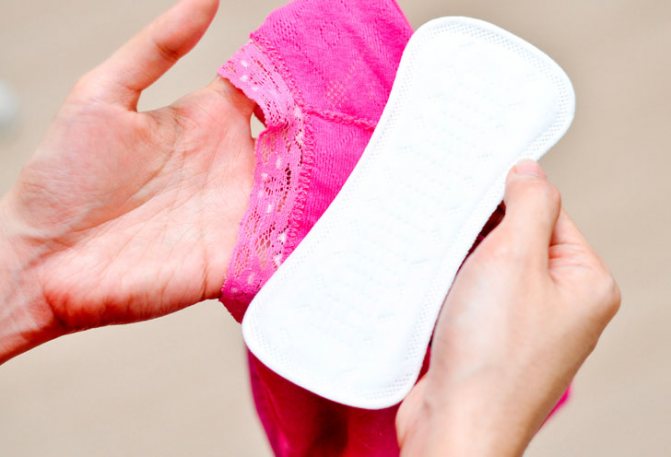
Following the end of the cleansing, a period of absence of menstruation begins, the duration of which varies for all women. Sometimes inexperienced mothers mistake lochia for the first menstruation, and when the bleeding stops and new bleeding does not begin, they are sure that they have a delay after childbirth.
Can there be a delay in menstruation after childbirth? Yes, for a complete resumption of the cycle, stabilization of hormonal levels is necessary. On average, this takes about 3 months from the moment of the first menstruation. During this period, discharge is irregular and varies in intensity.
Often, a situation where after childbirth you already had your period, and then there was a delay, occurs as a result of a new pregnancy. It is naive to believe that the absence of ovulation, regular discharge and breastfeeding guarantees a contraceptive effect. If the test is negative, but there is no period, a number of reasons contribute to this.
Why there is a delay in menstruation after childbirth:
- gynecological diseases - tumors, uterine and ovarian cysts, endometriosis, inflammation, etc.;
- disturbed hormonal levels - hyperprolactinemia, increased prolactin levels not associated with lactation;
- Sheehan syndrome, the second name for postpartum hypopituitarism, develops as a result of serious complications during childbirth and the recovery period;
- psychological factors - stress, lack of proper sleep.
The reasons for delayed menstruation in most cases still fit into the normal range. We are talking about both the time of the first appearance of discharge after childbirth, and the second menstruation, and the duration of the cycle as a whole.
Cycle Features
While pregnant, a woman does not have periods. Their absence is ensured by a specific hormonal background necessary for the preservation of the fetus.
There is no menstruation even after childbirth, provided breastfeeding, when the woman feeds the child on demand. The ovulation process is suppressed by prolactin, which is required for milk production, and progesterone. Therefore, it is impossible to get pregnant again during this period.
Critical days are absent for up to 6 months or more, and the recovery of the cycle occurs gradually and intermittently.
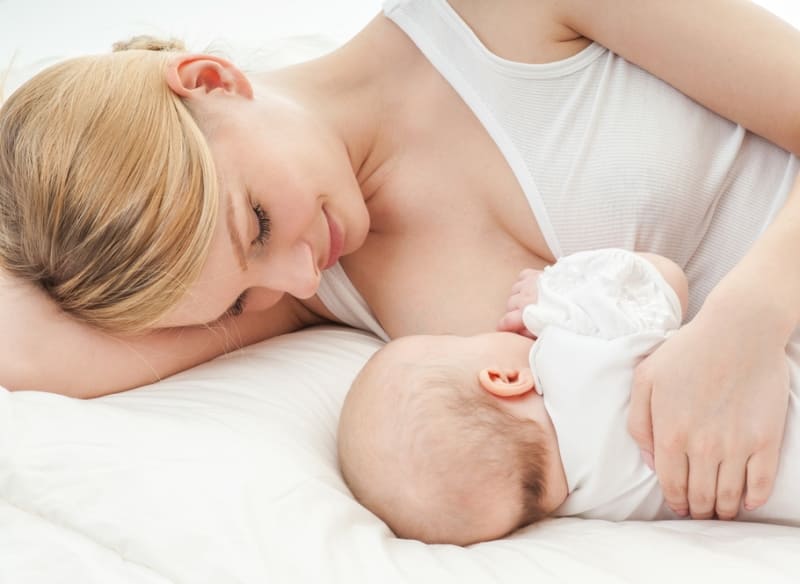
Reasons for missed periods while breastfeeding
Lactation and cycle
The course of pregnancy and childbirth does not affect the speed of the appearance of the first menstruation, but breastfeeding has a direct bearing on this. The hormone prolactin, released during lactation, suppresses ovulation and, consequently, the appearance of regular bleeding.
According to La Leche League International, in lactating women, in most cases, the cycle resumes 8-9 months after the birth of the child. At the same time, there is no talk of stopping lactation. Sometimes a delay in menstruation after childbirth during breastfeeding lasts more than a year or the entire period while active production of prolactin occurs.
But menstruation can occur at any stage of lactation; this is also a variant of the norm. This happens if a woman feeds on a schedule, nighttime feedings have disappeared, or when milk is no longer the only food for the baby and complementary foods are introduced.
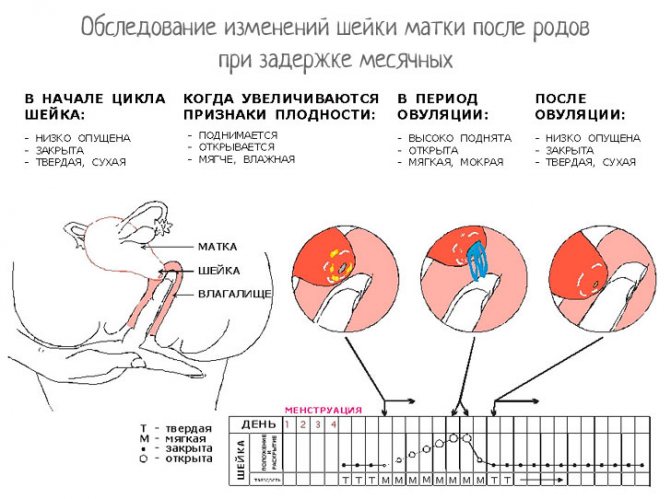
At first, the cycle during lactation is extremely unstable, the breaks between discharges are often uneven. The delay after the first menstruation can be up to two to three weeks, sometimes they appear every 20 days, less often once every 2 months.
The intensity of menstrual bleeding also changes. If before pregnancy the discharge was scanty, then after the birth of the child it becomes abundant, and vice versa. After childbirth, the uterus takes on a physiological position, which is why pain during menstruation, which was inherent earlier, disappears.
The regularity and nature of the discharge stabilizes within 2-4, less often within 6 cycles after the first menstruation. To exclude pathologies in the absence of systematic discharge, it is better to consult a doctor.
A mother with irregular periods, whose child is on IV, needs to be checked by a gynecologist. With artificial feeding, a cycle that does not recover for a long time signals developing diseases in the woman’s body.
Cycle recovery
For young mothers breastfeeding their newborns, the onset of “critical days” occurs in the fourteenth to sixteenth month. In 7% of mothers, restoration of menstruation is observed in the first 6 months. In 37% of women, this process occurs only after seven months or a year. At 22-24 months, the menstrual cycle is restored in approximately half of young mothers, and for 8% of women this process begins only after two years.
Passage of the lactation period
The presence or absence of breastfeeding is of great importance in restoring hormonal levels. Some women experience symptoms of lactational amenorrhea. This diagnosis is made when there is no menstruation after six months.
There is no need to worry, since the “lateness” of critical days by six months occurs for completely natural, physiological reasons.
The early arrival of “critical days” is due to the individual characteristics of the young mother’s body. Much depends on the activity of the pituitary gland, which is responsible for the release of the “lactation hormone”.
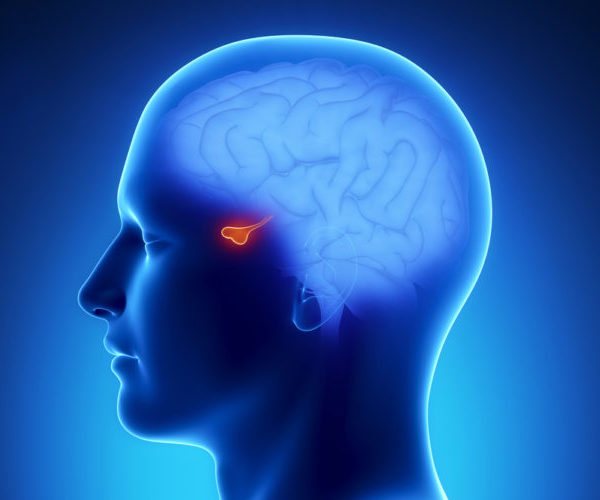
With artificial feeding
When a newborn baby is artificial, menstruation may return immediately after the uterine mucosa is restored. First, lochia stops, but the duration of the process of returning to normal ranges from one and a half to four to five months.
If there are no symptoms of uterine bleeding, then the discharge that occurs after the disappearance of lochia can be classified as standard menstruation. This phenomenon occurs infrequently. It can be observed 3-4 months after the birth of the child.
If a woman who has successfully given birth to a child notices that there are no “critical days” for more than four months during artificial feeding, she needs to urgently seek help from a doctor.
With mixed feeding
With mixed feeding, periods usually return within six months. You can expect their appearance before the end of the lactation period only after the introduction of complementary foods. Sometimes restoration of the cycle is observed in the third or fourth month after the birth of the child, but some women have to wait for the arrival of menstruation within 12 months.
This fluctuation in timing can be explained by the time of cessation of breastfeeding. Prolactin, the hormone responsible for the formation of milk, is produced as long as the baby feeds on it. The later his mother completes the feeding process, the longer her period does not come.




